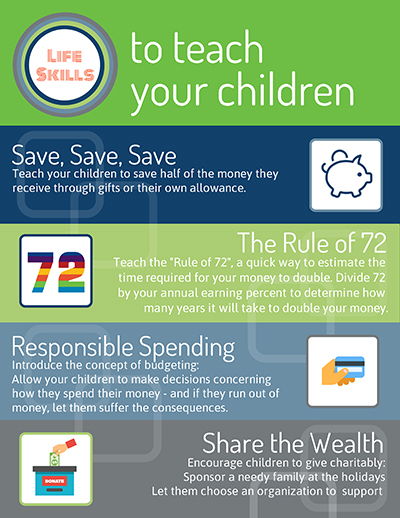
Looking for an activity that will benefit your children for the rest of their lives? Teach your children these three important lessons of money management: SAVE for your future; SPEND appropriately; and SHARE for the greater good of others and your community.
How are your children learning about money? Parents generally provide the first and most lasting lessons on how to handle finances. Be proactive with your children in developing their money skills. You may find that both of you enjoy and learn from the experience.
Successful money management is not a function of the amount, but rather the efficient allocation of the dollars between saving, spending, and sharing. If you can instill these three principles, your children will have a good foundation for making future money decisions.
Save
Teach your children to save half of the money they receive through gifts or their own earnings. Help them open a savings account. Share the monthly statements with them or let them view their account over the Internet. Encourage them to be interested in watching their money grow. When they accumulate $500 or more, work with them to select an appropriate mutual fund.
Teach them the “Rule of 72”, which is a quick way to estimate the time required for your money to double. Divide 72 by your annual earning percent. For example, if you anticipate your investment earning 8%, your money will double in 9 years. At a 6% rate, your money doubles in 12 years.
If your children are older and are employed for the summer, you may want to provide an incentive by matching the amount they save. Then establish a Roth IRA in their name and contribute the eligible amount. Annual contributions to this account of $1,000 beginning at age 15 will grow to over $570,000 by age 65. Just think of the amount that can accumulate if they learn this “pay-yourself-first” lesson early and contribute the maximum each year.
Spend
Teach your children responsible spending. Many parents begin this process when their children are young by providing a weekly allowance for entertainment or special purchases. Introduce the concept of budgeting by simply having your child write down everything they would like to purchase with their money. If the list is more than their money can buy, it is a perfect opportunity to talk about prioritizing and making good spending decisions.
During the teenage years, you may want to consider providing a monthly amount for clothing as well as entertainment. Extending the period of time as they get older will help them learn to manage their spending. Be certain that you and your child have an understanding of the intended use for the funds. Then allow your children to make decisions concerning how they spend their money, e.g. basic jeans at a reasonable price versus designer jeans at a premium. Be prepared for the mistakes! It is important that you do not bail them out by lending money or giving them their next allotment early. After all, their future employer will not do that! If they run out of money, let them suffer the consequences. The outcome may be watching TV with you versus going to the movies!
Share
The concept of sharing can be easily introduced at an early age. Most children delight in selecting and purchasing a surprise birthday gift for a sibling or friend. This is an excellent opportunity to discuss saving a little of their weekly allowance for the special occasion.
During the holidays, have the family prepare a basket for a needy family. Allow your children to purchase a special item for the basket out of their own funds. Be sure they experience the appreciation expressed by the receiving organization or family.
In order to encourage children to participate in charitable giving, you can allow them to select an organization to receive a contribution in their name. This may even give you an insight into areas of special interest that they may not have shared with you, such as a museum they visited or community youth organization that they find of interest.
Summary
Money management is simply learning to save, spend, and share responsibly. Children will learn from your actions first and from your teaching second. Be sure both are on target.

